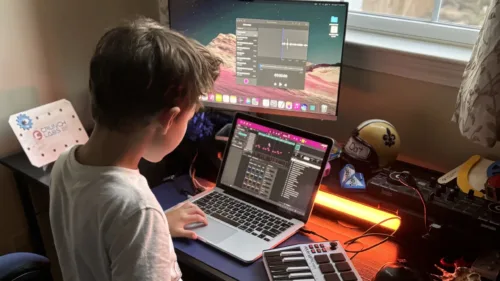Children and AI: The Next Generation of Learners

As a father of three young children—Benny (8), Emily (3), and Alice (1)—I spend a lot of time thinking about their education, their development, and the tools they will use to navigate the world. My wife and I have chosen to homeschool them, a decision shaped in part by her background in early elementary education and her firsthand experiences within the school system. While homeschooling offers incredible flexibility and deep, meaningful learning experiences, it also comes with unique challenges, particularly in maintaining engagement and discipline in a home setting.
Our oldest, Benny, has been something of a guinea pig in this journey. He thrives in our homeschooling environment, but like any child, he oscillates between deep engagement and distraction. Some days he’s fully present in his studies; other days, he’s more interested in goofing off, wandering around, or claiming he’s starving for the hundredth time.
One of the most interesting developments in our homeschooling approach has been the role of artificial intelligence. Given my work in AI-driven tools and software development, Benny has access to some pretty advanced hardware for an eight-year-old. While my wife and I don’t always see eye-to-eye on screen time, we both agree on one thing: he should not be aimlessly browsing the internet.
To address this, we introduced AI as a learning tool. Instead of allowing unrestricted web searches, we provided him with access to a paid AI service, such as ChatGPT, to answer his questions in a safe and controlled manner. The results have been fascinating.
The AI Curiosity Engine
When Benny isn’t actively learning with my wife, he still seeks knowledge—on his own terms. I occasionally check his AI chat history, and what I find is both amusing and encouraging. He asks about the history of Egypt, the role of pharaohs, and sometimes goes on tangents about Guinness World Records—things like the largest donut ever eaten or the smallest baby ever born.
This independent curiosity is exactly what education should cultivate. AI serves as a structured, accessible, and endlessly patient tutor that allows him to explore ideas without the risks of unrestricted internet access. It provides just enough guidance to keep him on track while still giving him the autonomy to learn at his own pace.
AI as a Learning Companion, Not a Replacement
Some parents fear AI. They worry about overreliance, misinformation, or the notion that AI will replace human educators. I see it differently. AI isn’t here to replace teachers or parents; it’s here to enhance and extend the learning experience. It’s a tool—like a book, a calculator, or a microscope—that can deepen understanding and fuel curiosity when used responsibly.
We still believe deeply in human interaction and guidance. Parenting, after all, requires active participation, personal attention, and moral guidance. But when children need time to explore independently, AI provides a structured way to keep their curiosity alive without the risks that traditional internet browsing can pose.
Raising the AI Generation
Our children will be the first true AI generation. They will grow up in a world where AI is not an abstract concept but an integrated part of daily life. How we introduce them to AI, how we guide their interactions, and how we set boundaries will shape their relationship with this technology for years to come.
I don’t see AI as a threat to our children’s future—I see it as a gift. When used correctly, AI can encourage learning, foster curiosity, and even teach valuable skills like critical thinking and problem-solving. As parents, it’s our job to ensure that AI is a tool for growth, not a crutch or a distraction.
The key is balance. AI won’t replace the value of face-to-face teaching, deep conversations, or the irreplaceable moments of human connection. But when children seek knowledge in their downtime, I find it encouraging that my son naturally gravitates toward AI as a learning tool rather than passive entertainment.
Instead of fearing AI, we should embrace its potential and guide our children in using it responsibly. The future belongs to those who know how to leverage technology wisely, and it’s up to us as parents to help them navigate it in a way that benefits their development, curiosity, and education.
